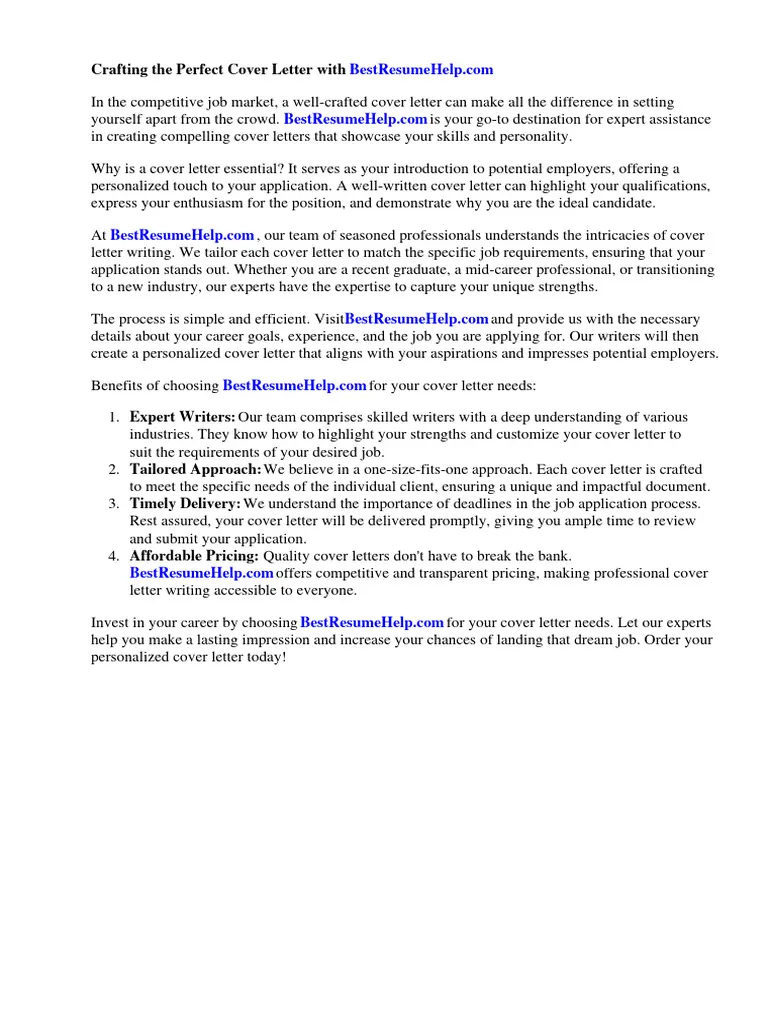Finance Internship How to Get One Quickly
Securing a finance internship without prior experience may seem daunting, but with a well-crafted cover letter and a strategic approach, it is entirely achievable. This guide will provide you with a step-by-step process to create a compelling cover letter that highlights your potential and increases your chances of landing an internship. By focusing on transferable skills, relevant projects, and demonstrating genuine enthusiasm, you can effectively showcase your value to potential employers. Remember that a strong cover letter is your first impression, so it’s crucial to make it count.
Crafting Your Cover Letter
The cover letter is your opportunity to make a strong first impression. It should be well-structured, concise, and tailored to the specific internship and company. Avoid generic templates; instead, personalize your letter to demonstrate your genuine interest and understanding of the role and the organization. Start with a strong opening that captures the reader’s attention, state the position you’re applying for, and briefly explain why you are a good fit. In the body of the letter, highlight your skills and experiences, focusing on what you can bring to the role. Conclude with a call to action, expressing your eagerness to learn more and the best way for them to contact you.
Highlighting Transferable Skills
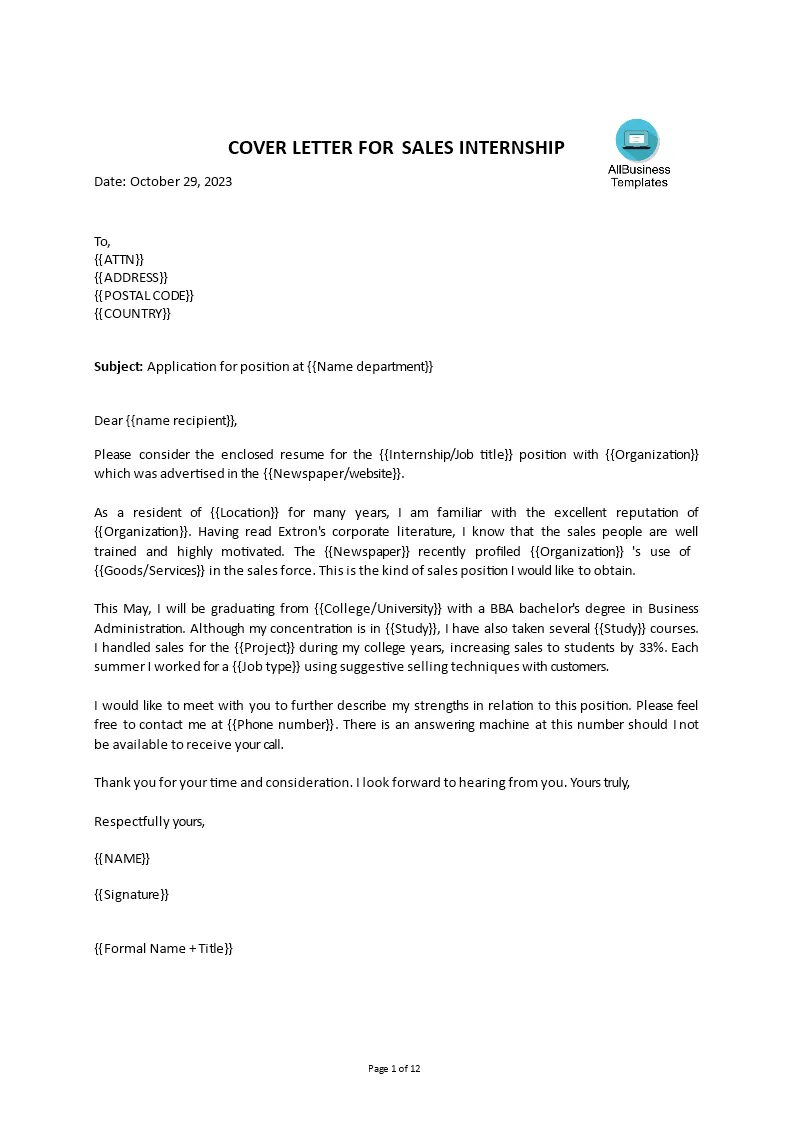
Even without direct finance experience, you likely possess transferable skills that are highly valued in the industry. These skills are applicable across various roles and industries and can significantly improve your chances of getting noticed. Skills like analytical thinking, problem-solving, communication, and attention to detail are all highly relevant. Furthermore, project management skills, leadership experience, and proficiency in software like Microsoft Excel or other analytical tools should also be emphasized. Provide specific examples of how you have used these skills in academic projects, volunteer work, or extracurricular activities to demonstrate your capabilities.
Identifying Relevant Projects
Highlighting projects, even if they weren’t directly finance-related, that demonstrate your relevant skills can boost your application. Did you manage a budget for a club or organization? Did you complete an analytical project as part of your coursework? These experiences can showcase your financial acumen. Be sure to provide details about your role, the tasks you performed, and the outcomes. Quantify your achievements whenever possible. For instance, if you improved the efficiency of a process, state the percentage improvement. Use strong action verbs to describe your contributions, such as ‘analyzed,’ ‘managed,’ or ‘implemented.’
Showcasing Your Education
Your education is a cornerstone of your application. Highlight your relevant coursework, especially if you have taken courses in accounting, economics, or financial modeling. Mention any academic achievements, such as a high GPA, Dean’s List recognition, or scholarships. Briefly describe any relevant projects or presentations you completed for your courses. If you are pursuing a degree in a field related to finance, such as accounting, business administration, or economics, make sure to clearly state this. Also, mention any specializations or areas of interest within your field of study.
Tailoring Your Letter
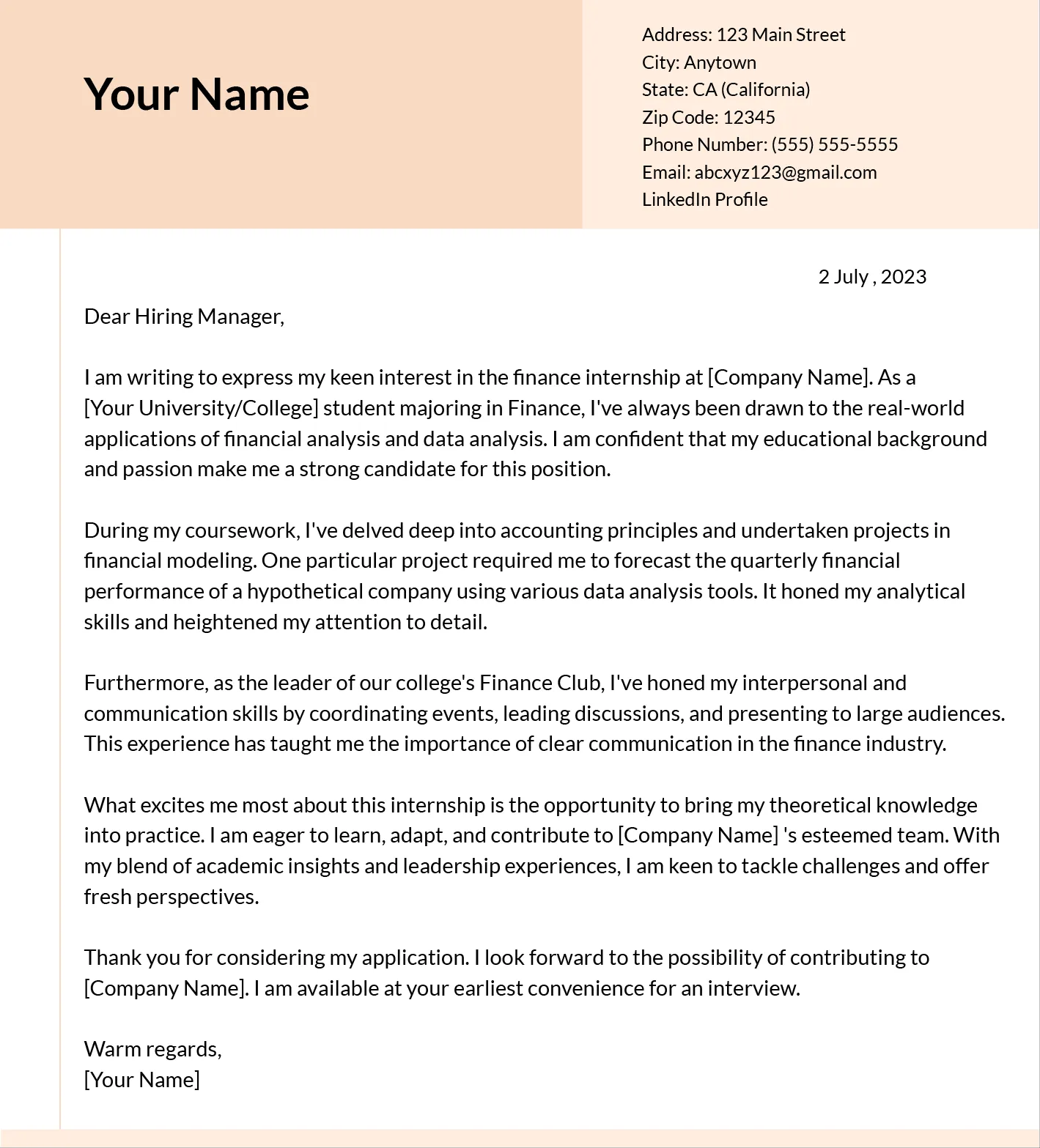
One size does not fit all. Customize your cover letter for each internship application. Review the job description carefully and identify the key skills and qualifications the employer is seeking. Then, tailor your letter to address these specific requirements. Use keywords from the job description to demonstrate that you have the skills and experience they are looking for. Mention the company’s name and reference specific aspects of the company, such as their values, their products, or recent news about the company. This shows that you’ve done your research and are genuinely interested in the opportunity.
Researching the Company
Thorough research into the company is essential before you start writing your cover letter. Explore the company’s website, social media profiles, and recent press releases to understand their mission, values, and recent projects. This information will help you tailor your cover letter and demonstrate your genuine interest in the company. Look for any recent news or achievements that you can mention in your cover letter. This shows that you are informed and interested in the company’s work, and it provides an opportunity to highlight how your skills and interests align with the company’s goals.
Demonstrating Your Enthusiasm
Show your enthusiasm for the finance internship. Employers want to hire individuals who are passionate and motivated. Your cover letter is the perfect place to demonstrate this enthusiasm. Express your interest and motivation for the specific role and why you are excited about the opportunity. Highlighting your career goals related to the company and the internship program can underscore your drive. Be sure to mention the specific aspects of the internship that appeal to you and explain how you believe you can contribute to the team. Genuine enthusiasm will help you stand out from other candidates.
Expressing Your Interest
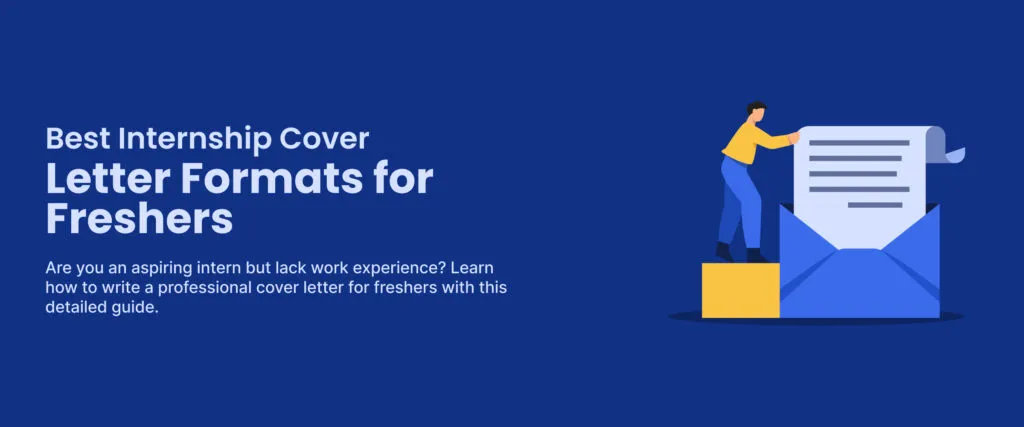
Express your interest in the specific role and the company in a way that goes beyond simply stating you’re interested. Explain what specifically attracts you to the internship. Do you admire the company’s culture, their financial performance, or their innovative work in the industry? Did a specific project or initiative by the company catch your attention? Mentioning these details shows that you’ve done your research and are genuinely interested in the opportunity. Show genuine curiosity about the opportunity and what you hope to gain from the experience.
Highlighting Your Motivation
Clearly articulate your motivation for applying for the finance internship. What are your career aspirations, and how does this internship align with your goals? Explain why you are passionate about finance and what you hope to learn from this experience. If you have a particular area of finance you are interested in, like investments or financial analysis, mention it. Demonstrate your willingness to learn, your work ethic, and your eagerness to contribute to the team. Show that you are not just looking for a job but are genuinely interested in a career in finance.
Mentioning Your Career Goals
Include a brief statement about your career goals and how the finance internship will help you achieve them. This demonstrates that you have a clear vision for your future and that you’re taking proactive steps to achieve it. Describe how the experience will help you develop the skills and knowledge you need to succeed. Mention your interest in the industry and what type of role you would like to pursue in the future. Be specific about the skills you hope to acquire and the contributions you aim to make. Show the recruiter that this internship is an important part of your long-term career plans.
Proofreading and Submitting
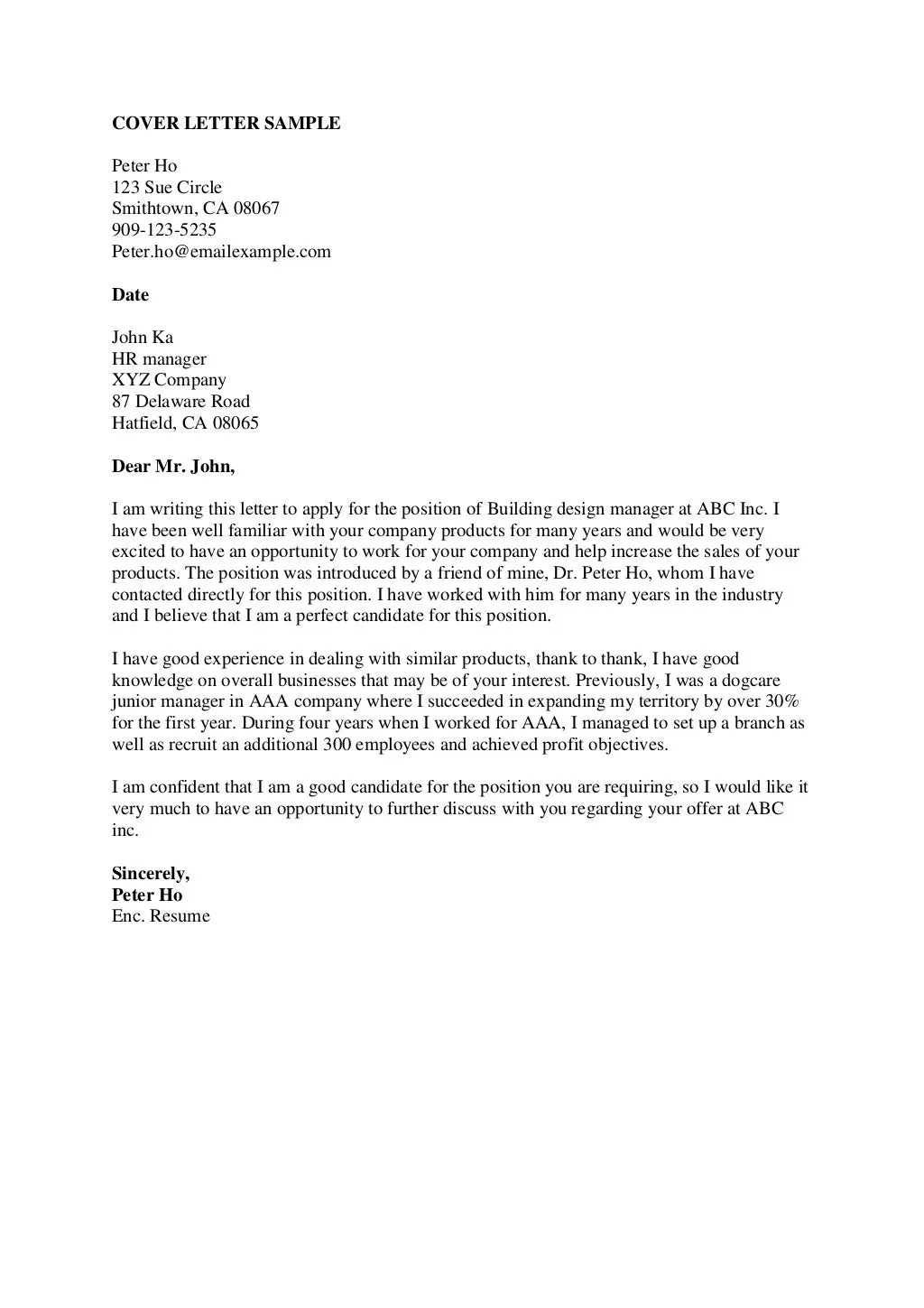
The final step is to proofread and submit your application. It is critical to ensure that your cover letter is free of any errors. Incorrect grammar, spelling mistakes, or formatting issues can make a negative impression. Take your time to carefully review every word and sentence. Use a grammar checker, ask a friend or mentor to review your letter, and make sure it sounds professional and polished. Then follow the application instructions and submit your cover letter. Don’t forget to save a copy of your application for your records and follow up with the hiring manager.
Formatting and Structure
Formatting is as important as content. Use a professional font such as Arial or Times New Roman, and set the font size between 10 and 12 points. Ensure that your cover letter is easy to read, with clear paragraph spacing and a professional layout. Use a formal business letter format, including your contact information, the date, and the hiring manager’s name and address. Keep your letter concise, typically one page. Use clear headings and bullet points to organize your content, making it easier for the reader to scan and understand your key qualifications.
Proofreading for Errors
Proofreading is an essential step that should not be skipped. Typos and grammatical errors can damage your credibility and give the impression that you are not detail-oriented. Read your cover letter multiple times, checking for any mistakes. Use a grammar checker, but also read the letter aloud to catch any awkward phrasing or sentences that don’t flow well. Ask a friend, professor, or career counselor to review your letter and provide feedback. A second pair of eyes can often spot errors that you might miss. Ensure your cover letter is perfect before submitting.
Submitting Your Application
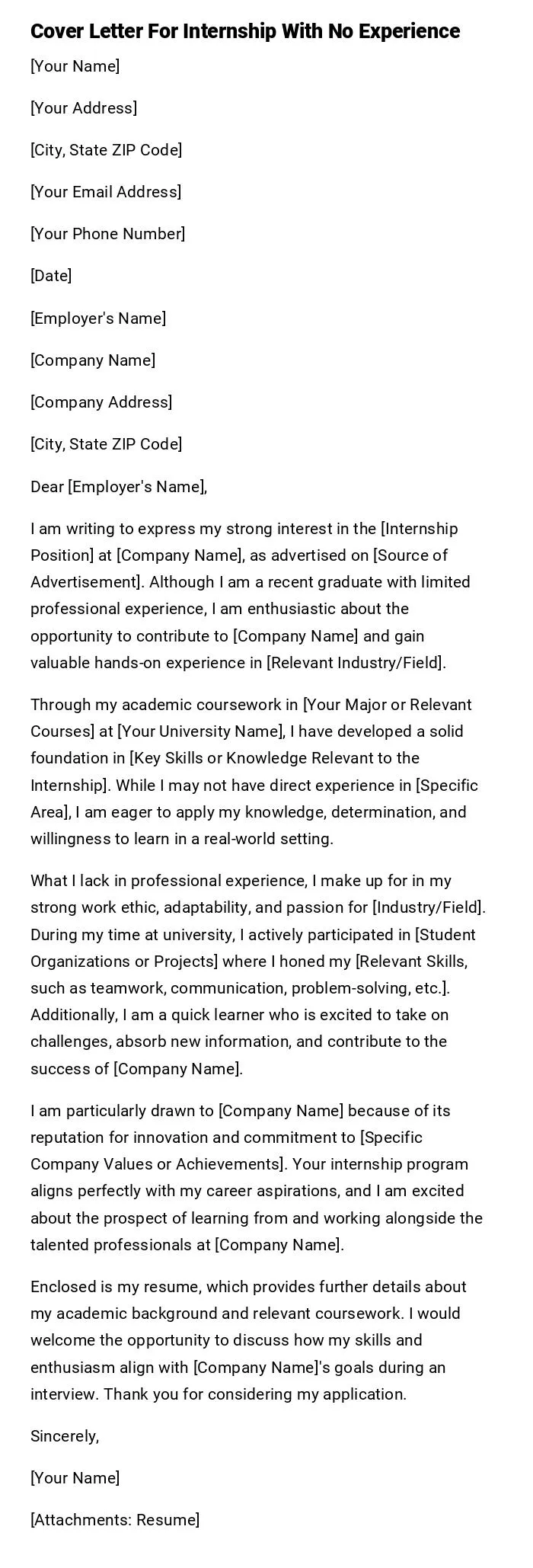
When submitting your application, follow the instructions provided by the employer. If they request that you submit your cover letter and resume in a specific format (e.g., PDF), make sure you adhere to those instructions. Make sure your files are properly named (e.g., “YourName_CoverLetter.pdf” and “YourName_Resume.pdf”). Ensure your contact information is accurate and up-to-date. It is a great practice to send the application and confirm the same from your email.
Following Up
Following up after submitting your application is a good practice. Sending a thank-you note or contacting the hiring manager can demonstrate your continued interest in the position. It also gives you a chance to clarify any points and reiterate your interest in the role. The best method of following up depends on the employer’s instructions and the company’s culture, so it’s a good idea to research this beforehand.
Sending a Thank-You Note
If you had an interview, sending a thank-you note within 24 hours is a must. Thank the interviewer for their time and reiterate your interest in the position. Briefly mention something specific that you discussed during the interview to show you were engaged and that you were listening. A thank-you note can help to remind the interviewer of your qualifications and enthusiasm, and it shows professionalism. It provides a perfect opportunity to restate your interest and highlight how your skills and experience align with the company’s needs.
Contacting the Hiring Manager
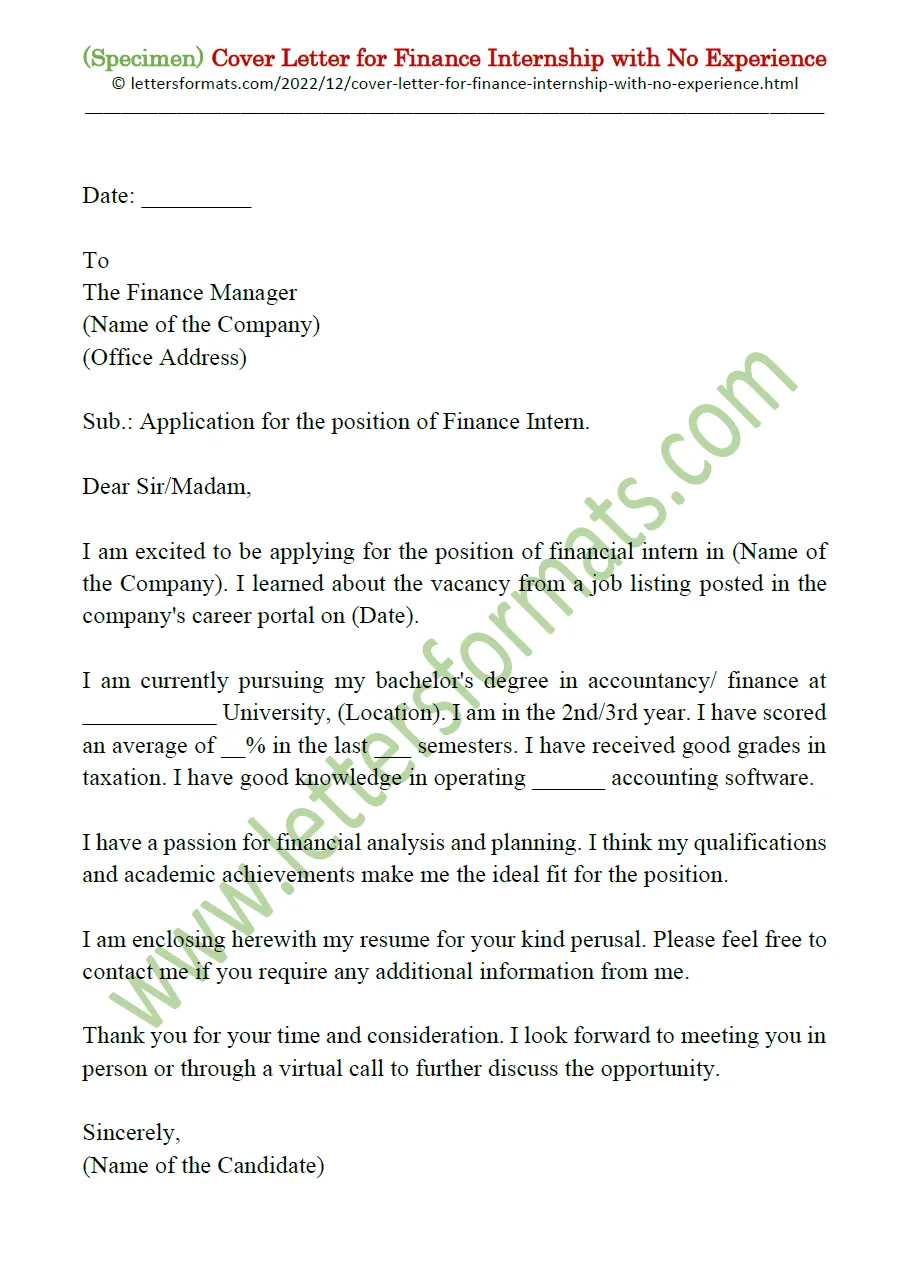
If you haven’t heard back within the timeframe specified by the employer, it is appropriate to contact the hiring manager or recruiter. A brief email or phone call to check on the status of your application can demonstrate your interest. However, be respectful of their time and avoid being overly persistent. Express your continued interest and ask if there is anything else you can provide. Briefly mention your key qualifications and why you are a good fit for the internship. Keep it concise and professional. Be patient and wait for a response. If you don’t hear back, accept it.
